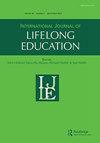父亲的阶级和母亲的教育程度哪个更重要?社会出身对成人学习参与的影响的分解和背景化
IF 1.9
Q2 EDUCATION & EDUCATIONAL RESEARCH
引用次数: 0
摘要
本文认为有必要将社会起源视为一种复杂的现象,以便更好地理解个人参与成人学习的决定因素。它:1)讨论了社会起源的概念化;2)分析它的两个组成部分——父母(父亲和母亲)的阶级和教育——是如何与参与非正式的与工作相关的成人学习相关联的;3)探讨这种关系是否存在于不同的福利制度中。我们认为,社会起源包括不同的相互关联但不可互换的成分,涉及父亲和母亲。他们中的每一个都有自己的影响,这就是为什么在探索成年人参与学习时应该同时考虑所有这些因素。从经验上看,这些分析是基于2018年对29个国家进行的第九轮欧洲社会调查的最新数据。采用logistic回归模型对数据进行分析。结果表明,父母(母亲和父亲)的阶级和教育对个人参与成人学习有独立的影响,这种影响嵌入在不同的福利制度中,在父亲或母亲的特征以及哪个更重要方面造成了福利制度之间的相当大的差异。本文章由计算机程序翻译,如有差异,请以英文原文为准。
Does father’s class or mother’s education matter more? Decomposing and contextualising the influence of social origin on adult learning participation
ABSTRACT This article argues for the need to regard social origin as a complex phenomenon in order to better understand the determinants of individuals’ participation in adult learning. It: 1) discusses the conceptualisation of social origin; 2) analyses how two of its components – parental (both father’s and mother’s) class and education – are interrelated with participation in non-formal job-related adult learning; 3) explores whether this relationship is embedded in different welfare regimes. We argue that social origin includes different interrelated but not interchangeable components that refer to both fathers and mothers. Each one of them has its own influence and that is why all of them should be considered at once in exploring adults’ involvement in learning. Empirically, the analyses are based on the latest data from the ninth round of the European Social Survey, carried out in 2018, for 29 countries. The data were analysed with logistic regression modelling. The results show that parental (mother’s and father’s) class and education have an independent influence on individuals’ participation in adult learning and that this influence is embedded in different welfare regimes creating considerable differences between welfare regimes in terms of whether father’s or mother’s characteristics and which ones are more important.
求助全文
通过发布文献求助,成功后即可免费获取论文全文。
去求助
来源期刊

International Journal of Lifelong Education
EDUCATION & EDUCATIONAL RESEARCH-
CiteScore
3.10
自引率
27.80%
发文量
40
期刊介绍:
The International Journal of Lifelong Education provides a forum for debate on the principles and practice of lifelong, adult, continuing, recurrent and initial education and learning, whether in formal, institutional or informal settings. Common themes include social purpose in lifelong education, and sociological, policy and political studies of lifelong education. The journal recognises that research into lifelong learning needs to focus on the relationships between schooling, later learning, active citizenship and personal fulfilment, as well as the relationship between schooling, employability and economic development.
 求助内容:
求助内容: 应助结果提醒方式:
应助结果提醒方式:


